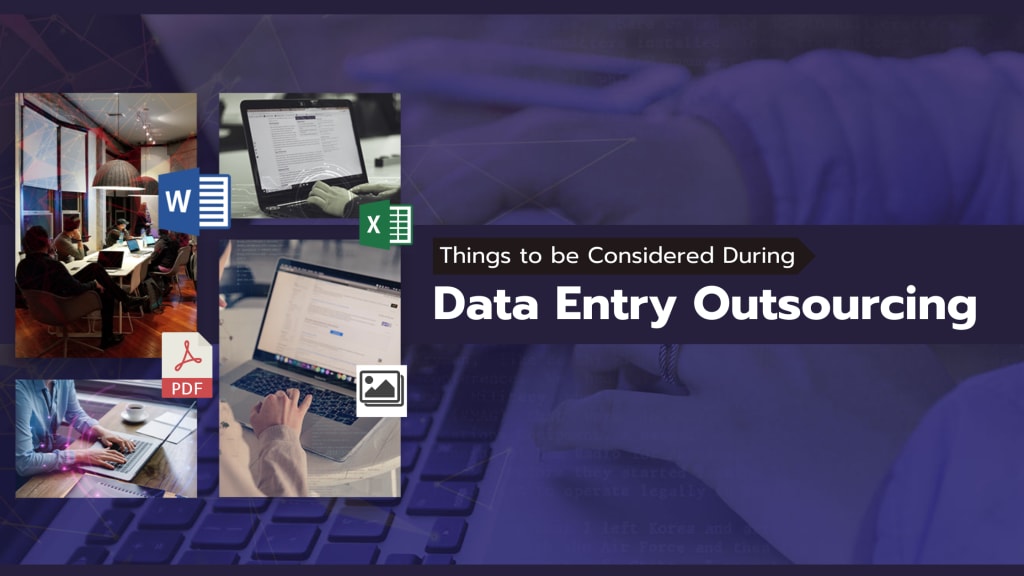Things to be Considered During Data Entry Outsourcing
Given the plethora of data entry outsourcing companies, finding the right one is an uphill task. To ease the process and help you make an informed decision, the blog lists down the important factors to be considered while making the choice.

In today's data-driven world, accurate and efficient data management is vital for businesses of all sizes. Picture this: a bustling medical research lab, racing against time to find a cure for a rare disease. Mountains of patient data - blood tests, scans, treatment records - hold the key, but they're trapped in paper files and handwritten notes. Thus, there arises the need for efficient data entry services.
Every name, date, and test result, meticulously typed and digitized, transforms those paper piles into a searchable, analyzable treasure trove. Algorithms can now scour the data, identifying patterns and correlations invisible to the human eye. Suddenly, connections emerge between seemingly unrelated symptoms, leading researchers closer to a breakthrough treatment.
This is the transformative power of data entry in 2023. It's not just about entering numbers in a spreadsheet; it's about unlocking the vast potential of information hidden within. In the medical lab, for example, a single typo could lead to a missed connection, potentially delaying a life-saving discovery. The accuracy and efficiency of data entry become matters of life and death, demonstrating how this often-underestimated role holds the power to shape the future, one keystroke at a time.
For businesses of all sizes, from retail chains optimizing inventory to fintech companies predicting market trends, accurate data entry fuels insights, drives decisions, and paves the way for innovation. However, maintaining internal data handling teams can be resource-intensive and hinder core operations. This is where data entry outsourcing emerges as a strategic solution, promising cost savings, increased scalability, and access to skilled professionals. Undoubtedly, outsourced data entry offers significant benefits when approached strategically. But before taking the plunge into the world of outsourced data entry, it's crucial to navigate the maze carefully.
Carefully assessing your needs, prioritizing security and accuracy, and establishing clear communication channels pave the way for a successful partnership. That said, listed below are the key considerations that every business must address for a successful and secure outsourcing journey:
1- Assessing Your Data Entry Needs
The first step involves introspectively analyzing your data entry requirements. Define the volume, complexity, and frequency of tasks. Will it be basic form filling, document conversion, or intricate medical record transcription? Understanding your specific needs helps you find a data entry outsourcing company with the relevant expertise and infrastructure.
2- Security and Data Privacy
Data security is paramount, especially when entrusting sensitive information to external entities. Scrutinize the security protocols of the data entry service provider. Are they equipped with robust firewalls, access control measures, and data encryption techniques? Do they comply with relevant data privacy regulations like GDPR or HIPAA? Thoroughly investigate their security certifications and history of data breaches.
3- Evaluating Data Accuracy and Quality Control
Accurate data is the cornerstone of informed decision-making. Assess the outsourcing company’s quality control procedures. Do they employ multi-level verification processes and statistical accuracy checks? Inquire about their training programs for data entry professionals and their performance metrics. Transparency in quality control methods fosters trust and ensures data integrity.
4- Communication and Collaboration
Effective communication is the lifeblood of any successful outsourcing partnership. Choose a data entry specialist with responsive communication channels and dedicated project managers. Seamless communication enables clear task delegation, timely progress updates, and efficient issue resolution. Consider time zone differences and establish preferred communication methods like email, chat, or video conferencing.
5- Cost and Payment Structure
Cost is a significant factor, but don't solely focus on the cheapest option. Evaluate the pricing structure in relation to their services, expertise, and security measures offered by different data entry outsourcing companies. Beware of hidden costs like setup fees, additional data validation charges, or overtime fees. Opt for transparent pricing models and establish payment terms clearly before signing any contracts.
6- Scalability and Flexibility
Business needs can evolve rapidly. Hire data entry professionals who are equipped to handle fluctuating data volumes and project complexities. Can they readily scale their team and resources up or down based on your requirements? Do they offer flexible engagement models like project-based contracts or retainer agreements? Opt for a service provider that adapts to your dynamic business needs.
7- Technology and Infrastructure:
Modern data entry involves more than just manual keystrokes. So, before you outsource data entry services to a professional provider, investigate their technological infrastructure. Do they utilize advanced data capture tools, such as optical character recognition (OCR), intelligent character recognition (ICR) software, and automated workflows? Employing cutting-edge technology enhances efficiency, reduces errors, and streamlines the data entry process.
8- Legal and Contractual Considerations
Outsourcing data entry tasks involves legal intricacies. Consult with legal counsel to review the service providers’ contract terms, service level agreements (SLAs), and non-disclosure agreements (NDAs). Ensure clarity on intellectual property rights, data breach liability, and dispute resolution mechanisms. Securely protect your confidential information and business interests.
9- Client Reviews and References
There are multiple data entry companies out there in the marketplace and each one claims to be the best. While this is an opportunity for businesses to grab a better deal—get high-quality results at effective rates; however, it can be confusing for players that are outsourcing for the first time.
Thus, it is advised to not rely solely on marketing claims. Conduct thorough research and check client reviews, testimonials, and case studies of the outsourcing company. Contact references to gain firsthand insights into the professional provider’s service quality, reliability, and communication style. Look for independent review platforms and industry accreditation to validate their claims and get a clear picture.
Navigating the Path Forward
Data entry outsourcing can be a valuable tool for businesses seeking to streamline data management and gain a competitive edge. However, careful planning, thorough evaluation of potential partners, and a commitment to building a strong collaborative relationship are crucial for ensuring a successful and mutually beneficial partnership. By understanding your needs, choosing the right provider, and fostering open communication, you can leverage the multiple advantages of outsourced data entry and empower your business to thrive in the data-driven age. Additionally, you can drive efficiency, optimize costs, and gain valuable insights for your company’s growth and success.
About the Creator
Sam Thomas
Tech enthusiast, and consultant having diverse knowledge and experience in various subjects and domains.






Comments
There are no comments for this story
Be the first to respond and start the conversation.